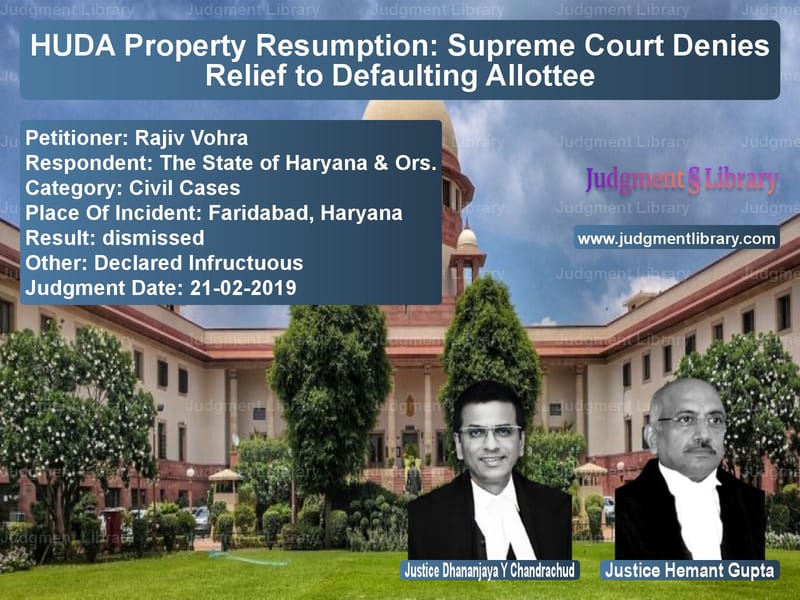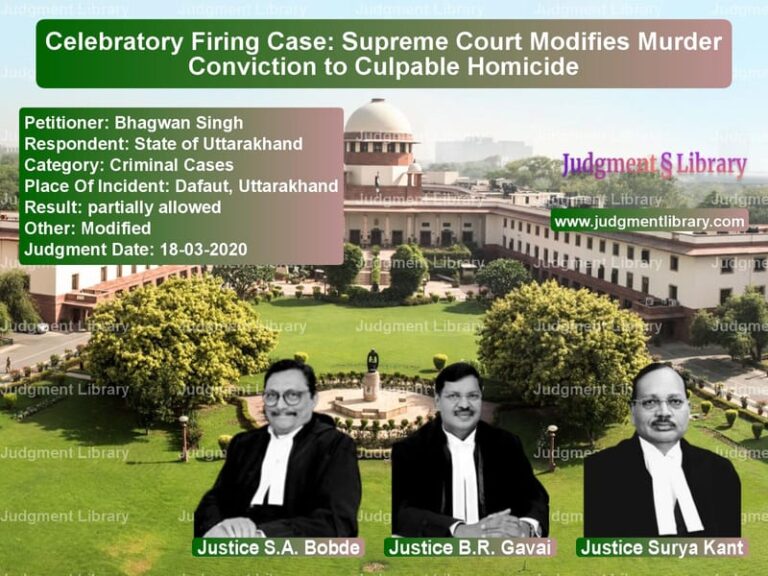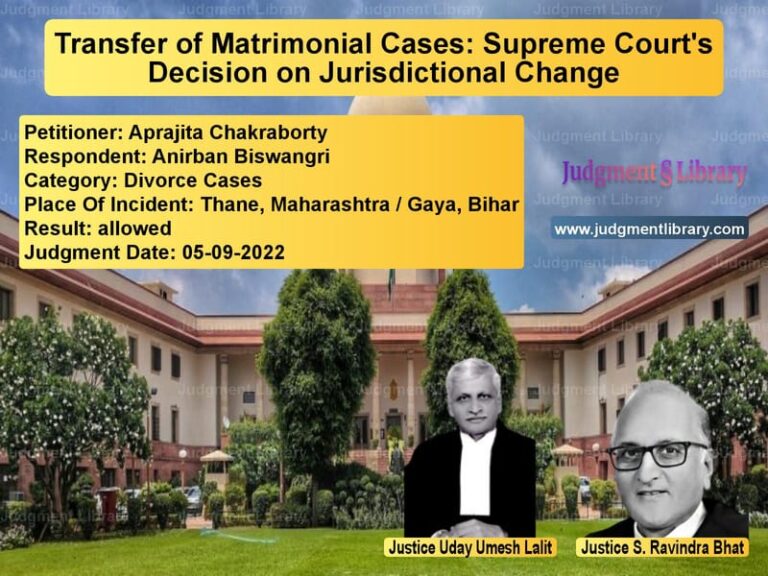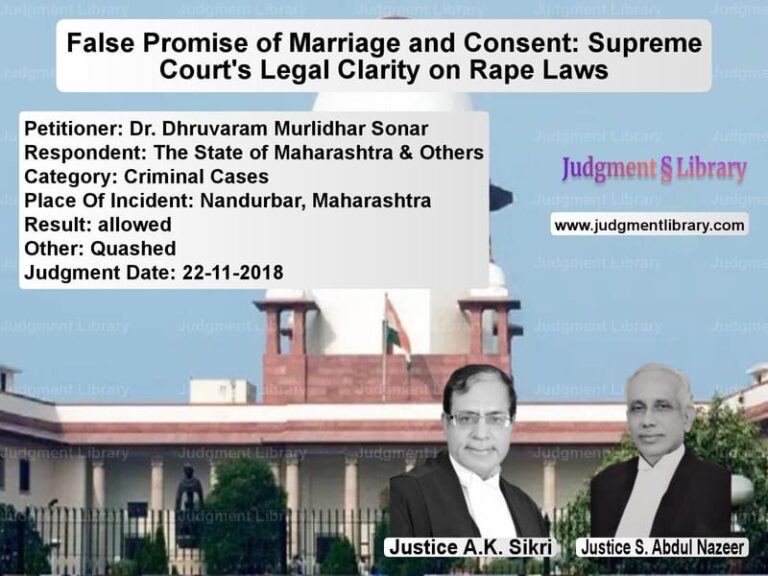HUDA Property Resumption: Supreme Court Denies Relief to Defaulting Allottee
The Supreme Court of India recently ruled on a long-standing dispute regarding the resumption of property by the Haryana Urban Development Authority (HUDA). The case, Rajiv Vohra v. The State of Haryana & Ors., involved a commercial booth allotted in 1996 and the appellant’s failure to pay the outstanding dues over 23 years. The Court upheld the resumption order, denying any relief under Article 142 of the Constitution.
Background of the Case
The case originated in 1996 when Rajiv Vohra successfully bid for a booth measuring 22.68 square meters in Sector 21-C, Faridabad, at a price of Rs. 7,55,000. As per the auction terms:
- The appellant paid 10% of the sale consideration (Rs. 75,500) as bid money.
- An additional 15% (Rs. 1,13,250) was payable within 30 days of the allotment letter.
- The remaining amount was to be paid within 60 days or in ten half-yearly installments with 15% annual interest.
Possession of the booth was handed over on May 6, 1996, and an allotment letter was issued on May 10, 1996. However, Vohra failed to make further payments, leading to a resumption order issued by HUDA on February 2, 2001.
Legal Proceedings
First Appeal Allowed by Administrator
Vohra appealed to the HUDA Administrator, who on January 4, 2011, set aside the resumption order under the condition that:
- The appellant clears all pending dues.
- A penalty of Rs. 2 lakhs is paid within 30 days.
In response, Vohra paid Rs. 7,00,000 on February 9, 2011, and the amount was encashed by HUDA.
Second Appeal Restores Resumption Order
HUDA challenged the Administrator’s decision, and the Chief Administrator reinstated the resumption order. Vohra filed a writ petition in the Punjab and Haryana High Court.
High Court Decision
On July 8, 2014, the High Court dismissed Vohra’s petition, citing:
- More than 20 years had elapsed since the initial allotment.
- The appellant had persistently failed to comply with the payment schedule.
Dissatisfied, Vohra approached the Supreme Court.
Arguments Before the Supreme Court
Petitioner’s Claims (Rajiv Vohra)
- The delay in payment was due to financial constraints and personal hardships.
- Since he had paid the full consideration and penalty, the resumption order should be set aside.
- The Court should invoke Article 142 to grant equitable relief.
Respondents’ Defense (State of Haryana & HUDA)
- The appellant had defaulted for over two decades, despite multiple opportunities.
- The property’s market value had significantly increased (estimated at Rs. 2.14 crores in 2019).
- Vohra executed a General Power of Attorney (GPA) in 2001, indicating an intent to profit rather than use the property.
Supreme Court’s Observations
The Supreme Court noted that:
- The appellant had defaulted on payments despite multiple notices from 1996 to 2000.
- Delays in filing appeals and restoration applications suggested an intent to delay payments.
- In previous cases like Smrita Jain v. HUDA, the Court had ruled that habitual defaulters are not entitled to relief.
The Court further observed:
“The jurisdiction under Article 142 cannot be invoked to protect an unscrupulous buyer who took possession of a commercial property by paying only 25% of the sale consideration and willfully defaulted on payments.”
Final Verdict
The Supreme Court dismissed the appeal, confirming the resumption order. The key directions were:
- HUDA was allowed to withdraw Rs. 20 lakhs deposited by Vohra as occupation charges.
- HUDA was to calculate the dues from May 6, 1996, and adjust them against the deposited amount.
- Any excess funds would be refunded with 6% annual interest.
- If the dues exceeded the deposited amount, HUDA could initiate recovery proceedings.
Key Takeaways
- Strict Adherence to Payment Terms: Buyers must comply with the terms of property allotments, as courts will not grant relief to persistent defaulters.
- Legal Precedent on Property Resumption: The judgment strengthens HUDA’s authority to reclaim properties from defaulting allottees.
- Article 142 and Equity: The Court clarified that equitable relief cannot be granted in favor of defaulters seeking to misuse legal provisions.
Conclusion
The Supreme Court’s decision in this case sets a strong precedent for urban development authorities, ensuring that commercial property allotments are honored in a fair and timely manner. The ruling reinforces that defaulting buyers cannot exploit legal loopholes to retain valuable public assets indefinitely.
Petitioner Name: Rajiv Vohra.Respondent Name: The State of Haryana & Ors..Judgment By: Justice Dhananjaya Y Chandrachud, Justice Hemant Gupta.Place Of Incident: Faridabad, Haryana.Judgment Date: 21-02-2019.
Don’t miss out on the full details! Download the complete judgment in PDF format below and gain valuable insights instantly!
Download Judgment: Rajiv Vohra vs The State of Haryana Supreme Court of India Judgment Dated 21-02-2019.pdf
Direct Downlaod Judgment: Direct downlaod this Judgment
See all petitions in Property Disputes
See all petitions in Landlord-Tenant Disputes
See all petitions in Contract Disputes
See all petitions in Judgment by Dhananjaya Y Chandrachud
See all petitions in Judgment by Hemant Gupta
See all petitions in dismissed
See all petitions in Declared Infructuous
See all petitions in supreme court of India judgments February 2019
See all petitions in 2019 judgments
See all posts in Civil Cases Category
See all allowed petitions in Civil Cases Category
See all Dismissed petitions in Civil Cases Category
See all partially allowed petitions in Civil Cases Category







